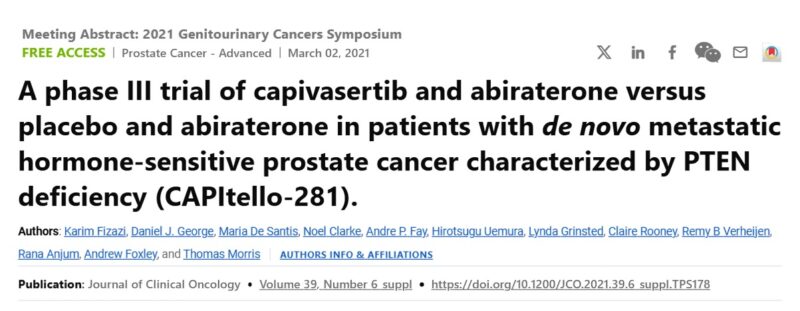AstraZeneca’s Truqap, in Combination with Abiraterone and ADT, Demonstrates Clinically Meaningful Benefit in PTEN-Deficient de Novo Metastatic Hormone-Sensitive Prostate Cancer
Positive high-level results from the CAPItello-281 Phase III trial revealed that AstraZeneca’s Truqap (capivasertib), when combined with abiraterone and androgen deprivation therapy (ADT), significantly improved radiographic progression-free survival (rPFS) compared to abiraterone and ADT with a placebo in patients with PTEN-deficient de novo metastatic hormone-sensitive prostate cancer (mHSPC).
Prostate cancer is the second most common cancer in men and the fifth leading cause of cancer-related deaths in men worldwide.
Only one-third of patients with metastatic prostate cancer survive for five years after diagnosis. Newly diagnosed mHSPC is an aggressive form of the disease with poor survival outcomes. Each year, around 200,000 patients are diagnosed with mHSPC, with one in four having PTEN-deficient tumors. These patients, in particular, face a much worse prognosis.
Metastatic hormone-sensitive prostate cancer (mHSPC), also referred to as metastatic castration-sensitive prostate cancer (mCSPC), occurs when prostate cancer cells rely on high levels of androgens to fuel cancer growth. Hormone therapies, including androgen deprivation therapy (ADT), are commonly used to block androgen action and reduce their levels in the body.
However, resistance to these therapies is frequent, creating a need for treatments that can extend their effectiveness and delay disease progression, including castration resistance, where the cancer continues to grow and spread despite hormone therapy.
In patients with de novo mHSPC, the cancer has already spread to distant parts of the body at the time of initial diagnosis. Loss or deficiency of PTEN promotes the growth of cancer cells, disrupting the PI3K/AKT pathway and is linked to poorer outcomes in prostate cancer patients.
Karim Fizazi, MD, PhD, Institut Gustave Roussy, and University of Paris Saclay in Villejuif, France, and principal investigator for the trial said:
“Patients with this aggressive form of prostate cancer with tumour PTEN deficiencycurrently face a particularly poor prognosis, and there is an urgent need for new treatments that improve upon current therapies.
The results seen with capivasertib in combination with abiraterone-prednisone and androgen deprivation therapy in the CAPItello-281 trial represent a step forward for these patients.”

The Truqap combination showed an early indication of improving OS compared to the placebo combination. The trial will continue as planned to further evaluate OS as a key secondary endpoint. The safety profile of Truqap in combination with abiraterone and ADT in CAPItello-281 was broadly consistent with the known profile of each medicine.
Susan Galbraith, Executive Vice President, Oncology R&D, AstraZeneca, said:
“These results show for the first time, that adding an AKT inhibitor to a standard-of-care therapy can provide benefit to patients with a biomarker of PTEN-deficient metastatic hormone-sensitive prostate cancer.
By targeting a key driver of the disease, we have been able to improve upon current therapies and demonstrate the potential role of this combination in an area of critical unmet need. It will be important to see greater maturity in key secondary endpoints including overall survival.”

CAPItello-281
CAPItello-281 is a Phase III, double-blind, randomized trial that is assessing the efficacy and safety of Truqap in combination with abiraterone and androgen deprivation therapy (ADT) compared to a placebo with abiraterone and ADT in treating patients with PTEN-deficient de novo metastatic hormone-sensitive prostate cancer (mHSPC).
The trial, conducted globally, included 1,012 adult participants with histologically confirmed de novo hormone-sensitive prostate adenocarcinoma and PTEN deficiency, as confirmed by central testing. The primary outcome measure of the CAPItello-281 trial is radiographic progression-free survival (rPFS), as evaluated by the investigator, while overall survival (OS) is a secondary endpoint.
Truqap
Truqap is a first-in-class, potent inhibitor of all three AKT isoforms (AKT1/2/3), acting by competing with adenosine triphosphate (ATP). It is taken at a dose of 400mg twice daily, following an intermittent schedule of four days on and three days off, a regimen selected in early-phase trials for its tolerability and ability to effectively inhibit the target.
Approved in the US, EU, Japan, and several other countries, Truqap is used to treat adults with HR-positive (or ER-positive), HER2-negative locally advanced or metastatic breast cancer that has one or more biomarker alterations (such as PIK3CA, AKT1, or PTEN) after recurrence or progression following an endocrine-based treatment. It is also approved in Australia for the same indication, based on the results from the CAPItello-291 trial.
Currently, Truqap is being evaluated in Phase III trials for breast cancer (CAPItello-292) and prostate cancer (CAPItello-280 and CAPItello-281) in combination with other standard treatments.
Truqap was discovered by AstraZeneca following a collaboration with Astex Therapeutics and its partners, the Institute of Cancer Research and Cancer Research Technology Limited.
A phase III trial of capivasertib and abiraterone versus placebo and abiraterone in patients with de novo metastatic hormone-sensitive prostate cancer characterized by PTEN deficiency (CAPItello-281).
Authors: Karim Fizazi, Daniel J. George, Maria De Santis, Noel Clarke, Andre P. Fay, Hirotsugu Uemura, Lynda Grinsted, Claire Rooney, Remy B Verheijen, Rana Anjum, Andrew Foxley, and Thomas Morris

Data will be presented at a forthcoming medical meeting and shared with global regulatory authorities.
AstraZeneca
AstraZeneca (LSE/STO/Nasdaq: AZN) is a global, science-led biopharmaceutical company that focuses on the discovery, development, and commercialisation of prescription medicines in Oncology, Rare Diseases, and BioPharmaceuticals, including Cardiovascular, Renal & Metabolism, and Respiratory and Immunology. Based in Cambridge, UK, AstraZeneca’s innovative medicines are sold in more than 125 countries and used by millions of patients worldwide.
AstraZeneca in oncology
AstraZeneca is at the forefront of a revolution in oncology, with the goal of curing all forms of cancer. By advancing scientific research to better understand cancer and its complexities, the company strives to discover, develop, and deliver life-changing treatments to patients.
AstraZeneca is particularly focused on tackling some of the most difficult cancers. Through continuous innovation, the company has built one of the industry’s most varied portfolios and pipelines, which have the potential to reshape medical practices and significantly improve the patient experience.
AstraZeneca envisions transforming cancer care and ultimately eliminating cancer as a leading cause of death.
Further Reading:
Immunotherapy for Prostate Cancer
Prostate Cancer: What patients should know about
AstraZeneca Revealed Positive Results for Muscle Invasive Bladder Cancer Patients




